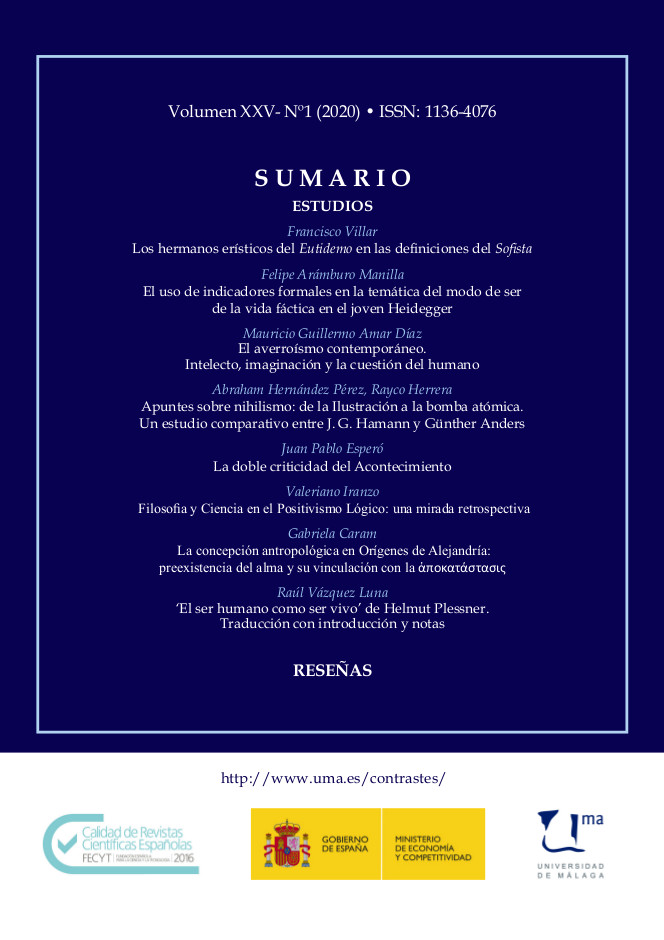'El ser humano como ser vivo' de Helmut Plessner. Traducción con introducción y notas
DOI:
https://doi.org/10.24310/Contrastescontrastes.v25i1.7130Keywords:
PLESSNER, SER HUMANO, VIVIENTE, POSICIONALIDAD, POSICIONALIDAD EXTRÍNSECA, REFLEXIVIDAD, INTERIORIDAD, EXTERIORIDAD.Abstract
En 1967, Helmuth Plessner publica en Merkur una síntesis de su pensamiento titulado «El ser humano como ser vivo». Este trabajo de investigación ha consistido en realizar una traducción, con un gran número de aparato crítico en forma de notas, y con un estudio introductorio. En el texto, Plesner expone el carácter diferencial del viviente humano en comparación con los demás animales, carácter por el que trasciende el ámbito de lo zoológico, permaneciendo no obstante en él. Por eso, el estudio introductorio, se centra tras las cuestiones historiográficas pertinentes, en las condiciones antropológicas de posibilidad de la posicionalidad diferencial del ser humano ante la realidad, también la propia. Condiciones que se descubren en la reflexividad, la interioridad y la exterioridad.
Downloads
Metrics
Publication Facts
Reviewer profiles N/A
Author statements
Indexed in
-
—
- Academic society
- N/A
- Publisher
- Universidad de Málaga
References
Alsberg, P., Das Menschheitsrätsel: Versuch einer prinzipiellen Lösung, Dresden: Im Sybillen-Verlag, 1922; [In Quest of Man: A Biological Approach to the Problem of Man´s Pace in Nature, New York: Pergamon Press, 1970].
Buytendijk, F. J. J., «Mensch und Tier. Ein Beitrag zur vergleichenden Psychologie» en Tijdschrift Voor Filosofie, 20 (4):754-754, 1958
Buytendijk, Fr.-J. J «Die Psychologie der Kleidung» en Internationales Jahrbuch für philosophische Anthropologie, vol. 8/1, 1955.
Chardin, Th., La visión del pasado, Narper & Row, Nueva York, 1964.
Haeckel, E., Anthropogenie oder Entwickelungsgeschichte des Menschen, Wilhelm Engelmann, Leipzig, 1874,
Haeckel, E., Über unsere gegenwärtige Kenntnis vom Ursprung des Menschen, Vortrag gehalten auf dem vierten Internationalen Zoologen-Congress in Cambridge, Strauss, 1898.
Handsum, Kn., Misterios, Alfagura, Madrid, 1992.
Hayes «The Cultural Capacity of Chimpanzees» (Hum. Biol. 26, 1954).
Hayes, Catherine, The Ape in Our House, Harper, New York, 1951.
Hayes, K. J., & Hayes, C. (1952). «Imitation in a home-raised chimpanzee» en Journal of Comparative and Physiological Psychology, 45(5), 450-459.
Hayes, K.J., Nissen, C.H., «Higher mental functions of a home-raised chimpanzee». en Schrier, A.M. and Stollnitz, F. (eds). Behaviour of Non-human Primates, 4,50-115. Academic Press, New York, 1971.
Herder, Ensayo sobre el origen del lenguaje, en Obra selecta, Alfaguara, Madrid, 1982
Herder, Ideas para una filosofía de la historia de la humanidad, Losada, Buenos Aires, 1959.
Humboldt, Sobre la diversidad de la estructura del lenguaje humano y su influencia sobre el desarrollo espiritual de la humanidad. (Trad y pról. A. Agud), Anthropos, Barcelona, 1990.
Jacob, H., «Knut Hamsun und Thomas Mann: Eine kunstwissenschaftliche Untersuchung an Hand der Romane "Das letzte Kapitel" und "Der Zauherberg"» en Philosophischer Anzeiger, 4/2, 1929.
Klages, L., Der Geist als Widersacher der Seele, Lipsia, vol. 33, p. 403., 1929
Kleist, Heinrich von Sobre el teatro de marionetas y otros ensayos de arte y filosofía, Hiperión, Madrid, 1988
Leeuw, Gerardus van der Der Mensch und die Religion: anthropologischer Versuch. Haus zum Falken, Basel, 1941.
Lessing, Th., Geschichte als Sinngebung des Sinnlosen, Reinicke, Leipzig, 1927
Leyte, A., «Introducción» en Schelling, F. W. J., Escritos de Filosofía de la Naturaleza, Alianza Editorial, Madrid, 1996
Litt, Theodor, Möglichkeiten und Grenzen der Pädagogik. Abhandlungen zur gegenwärtigen Lage von Erziehung und Erziehungstheorie, B. G. Teubner, Leipzig/Berlin 1926
Mann, Th., Señor y perro. Tonio Kröger. Tristán, Edhasa, Barcelona, 1984
Murillo, J. I., «La antropología filosófica de Helmuth Plessner y el problema mente-cerebro» en Thémata. Revista de filosofía, 46/2012
Padial, Juan J., La antropología del tener según Leonardo Polo, Servicio de publicaciones de la Universidad de Navarra, Cuadernos de Anuario Filosófico, nº 100, Pamplona, 2000.
Plessner, H., «Der Mensch als Lebewesen» en Merkur. Deutsche Zeitschrift für europäisches Denken, Junio de 1967, Heft 231, pp. 536-546.
Plessner, H., Die Stufen des Organischen und der Mensch. Einführung in die philosophische Anthropologie, Gesammelte Schriften IV, Suhrkamp, Frakfurt, 1981.
Polo. Cfr.: «Tener y dar». En, VV.AA. (Fernando Fernández coord.): Estudios sobre la encíclica “Laborem exercens". Madrid: BAC, 1987; pp. 201-30.
Schelling, F. W. J., Escritos de Filosofía de la Naturaleza, Alianza Editorial, Madrid, 1996
Spengler, O., Der Untergang des Abendlandes. Umrisse einer Morphologie der Weltgeschichte, I, Braumüller, Viena, 1918; II, C. H. Beck, Múnich, 1922.
Downloads
Published
How to Cite
Issue
Section
License
This journal provides immediate free access to its content under the principle of making research freely available to the public. All content published in Contrastes. Revista Internacional de Filosofía, are subject to the Creative Commons Attribution-NonCommercial-ShareAlike 4.0 license whose full text can be found at <http://creativecommons.org/licenses/by-nc-sa/4.0>
It is the responsibility of the authors to obtain the necessary permissions of the images that are subject to copyright.
Authors whose contributions are accepted for publication in this journal will retain the non-exclusive right to use their contributions for academic, research and educational purposes, including self-archiving or repository in open access repositories of any kind.
The electronic edition of this magazine is edited by the Editorial Service of the University of Malaga (Uma Editorial), being necessary to cite the origin in any partial or total reproduction.










5.png)
